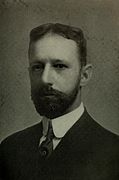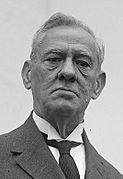
The Canadian Alliance, formally the Canadian Reform Conservative Alliance, was a conservative and right-wing populist federal political party in Canada that existed from 2000 to 2003. The party was the successor to the Reform Party of Canada and inherited its position as the Official Opposition in the House of Commons of Canada and held it throughout its existence. The party supported policies that were both fiscally and socially conservative, seeking reduced government spending on social programs and reductions in taxation.
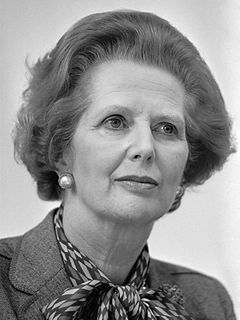
The 1987 United Kingdom general election was held on Thursday 11 June 1987, to elect 650 members to the House of Commons of the United Kingdom. The election was the third consecutive general election victory for the Conservative Party, and second landslide under the leadership of Margaret Thatcher, who became the first Prime Minister since the Earl of Liverpool in 1820 to lead a party into three successive electoral victories.
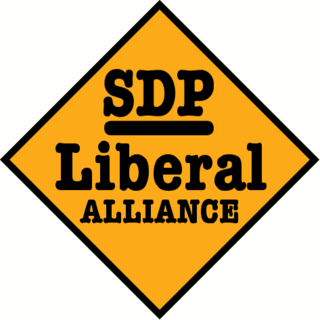
The SDP–Liberal Alliance was a centrist political and electoral alliance in the United Kingdom. Formed by the Social Democratic Party (SDP) and the Liberal Party, the Alliance was established in 1981, contesting the 1983 general election, 1984 European election and 1987 general election. The Alliance ceased to exist in 1988, when the two component parties merged to form the Social and Liberal Democrats, later renamed the Liberal Democrats.

The Constitutionalist Liberal Party is an opposition political party in Nicaragua. At the Nicaraguan general election of 5 November 2006, the party won 25 of 92 seats in the National Assembly. However, the party suffered a devastating loss in the 2011 general election, losing 23 seats in the National Assembly.

The United Democratic Party (UDP) is one of the two major political parties in Belize. It is the ruling party, having won the 2008, 2012 and 2015 general elections. A centre-right conservative party, the UDP is led by Prime Minister of Belize Dean Barrow.
The RENAMO-Electoral Union is an alliance of political parties in Mozambique, led by the Mozambican National Resistance of Afonso Dhlakama.
This article gives an overview of liberalism in the United Kingdom. It is limited to liberal parties with substantial support, mainly proved by having had a representation in parliament. The sign ⇒ denotes another party in that scheme. For inclusion in this scheme, it is not necessary that parties labelled themselves as a liberal party.
The Autonomist Liberal Party, renamed usually semplified in Liberal Party in 1898, was one of major parties from 1910 until the Cuban Revolution the late 1950s, when it was exiled.

Elections in Nicaragua gives information on elections and election results in Nicaragua.
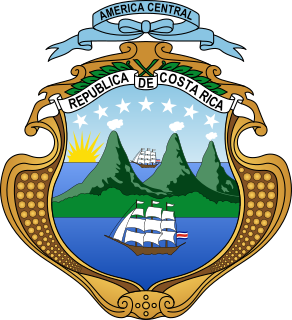
Patriotic Alliance is a political party in Costa Rica.

The Patriotic Society Party, formerly the January 21 Patriotic Society is a populist and personalist political party in Ecuador, led by former army colonel Lucio Gutiérrez. 21 January refers to the date of the 2000 Ecuadorean coup d'état.
The Greenwich by-election of 1987 was a by-election to the British House of Commons held on 26 February 1987, shortly before the 1987 general election. The election was caused by the death of Guy Barnett, Labour Party Member of Parliament for Greenwich on 24 December 1986.

The Conservative and Unionist Party, also known as Northern Ireland Conservatives is a section of the United Kingdom's Conservative Party that operates in Northern Ireland. The party won 0.4% of the vote in the Northern Ireland Assembly election, 2016, and 0.3% of the vote in the Northern Ireland Assembly election, 2017.

Local elections were held in the United Kingdom in 1983. The results were a success for Conservative Prime Minister Margaret Thatcher, who soon afterwards called a general election in which the Conservatives won a landslide victory. The projected share of the vote was Conservative 39%, Labour Party 36%, Liberal-SDP Alliance 20%.

Constitutional Assembly elections were held in Cuba on 15 September 1900. The result was a victory for the Republican-Democratic Coalition, which won 18 of the 31 seats.

The United Kingdom's component of the 2014 European Parliament election was held on Thursday 22 May 2014, coinciding with the 2014 local elections in England and Northern Ireland. In total, 73 Members of the European Parliament were elected from the United Kingdom using proportional representation. England, Scotland and Wales use a closed-list party list system of PR, while Northern Ireland used the single transferable vote (STV).
Parliamentary elections were held in Colombia on 11 March 2018 to elect 102 members of the Senate and 166 members of the House of Representatives.
Elections for the London Borough of Merton were held on 6 May 1982 to elect members of Merton London Borough Council in London, England. This was on the same day as other local elections in England and Scotland.
The 1992 York City Councils elections were held in May 1992 to elect members of York City Council in North Yorkshire, England. Fifteen seats, previously contested in 1988, were up for election: eleven were won by the Labour Party, three by the Conservative Party and one by the Liberal Democrats. The Labour Party retained overall control of the council; the composition of the council after the election was: Labour Party 34 seats, Conservative Party seven seats and Liberal Democrats four seats.



